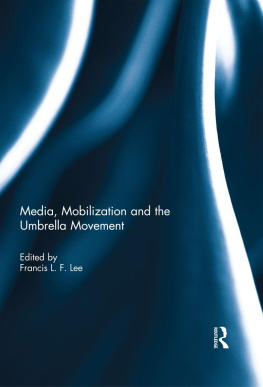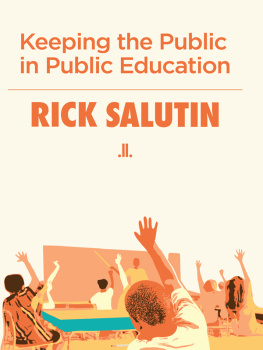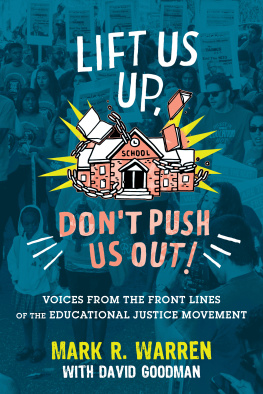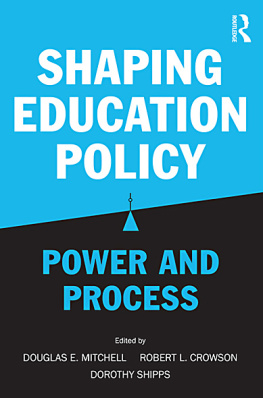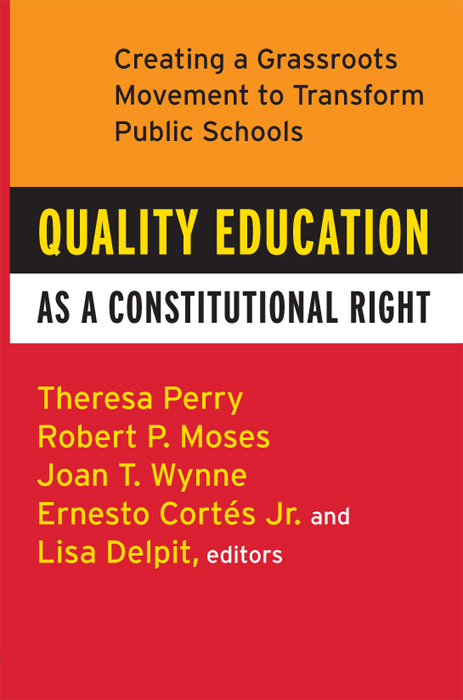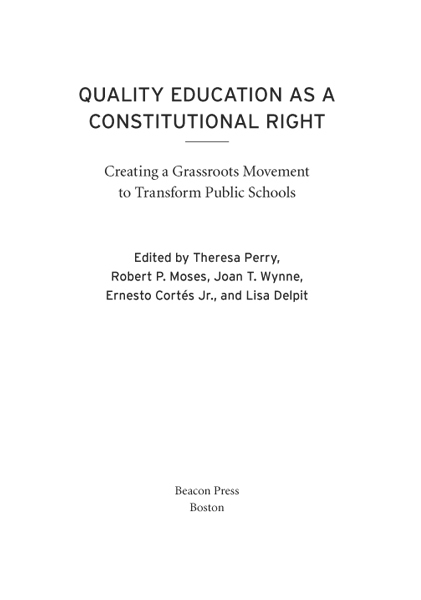The Historical and Contemporary Foundations for Robert Mosess Call to Make Quality Education a Constitutionally Guaranteed Right
Theresa Perry
1. Miss Bakers Grandchildren: An Interview with the Baltimore Algebra Project
Charles M. Payne
2. Reading, Writing, and Rights: Ruminations on Getting the Law in Line with Educational Justice
Imani Perry
3. Schools That Shock the Conscience: What Williams v. California Reveals about the Struggle for an Education on Equal Terms Fifty Years after Brown
Jeannie Oakes
4. Constitutional Property v. Constitutional People
Robert P. Moses
5. Quality Education as a Civil Right: Reflections
Ernesto Corts Jr.
6. Stepping Stories: Creating an African American Community of Readers
Kimberly N. Parker
7. Is This School?
Alicia Carroll
8. Stories of Collaboration and Research within an Algebra Project Context: Offering Quality Education to Students Pushed to the Bottom of Academic Achievement
Joan T. Wynne and Janice Giles
9. Culturally Responsive Pedagogies: Lessons from Teachers
Lisa Delpit
INTRODUCTION
The Historical and Contemporary Foundations for Robert Mosess Call to Make Quality Education a Constitutionally Guaranteed Right
Theresa Perry
It was a chilly day in March. March 11, 2005, to be exact. They came from all over the countryfrom the Mississippi Delta; from Los Angeles and Oakland California; New Haven and New Orleans; Denver, Colorado; Cambridge and Boston; Miami and Chicago; and the list goes on. They were established scholars and venerable civil rights iconsCharlie Cobb, Dave Dennis, Curtis Muhammad, James Comer, Jeannie Oakes, Charles Payne, Lisa Delpit, and Vincent Harding, to name a few. They came from local communities, large and small, rural and urban. They were ordinary people, individuals who had already spent a lifetime working for social justiceteachers, preachers, organizers, community leaderswhose names were known only by people whose lives they had touched, not once, but over and over again. And there were the young people, members of the hip-hop generation, some the sons and daughters of the sixties generation, others still in middle and high school. They came because, like previous generations, they had the fire for justice in their bones. They all came because of a call, a shout out, an e-mail sent by Robert P. Bob Moses, a hero of the civil rights movement, formerly a field secretary for the Student Nonviolent Coordinating Committee (SNCC), one of the organizers of Mississippi Freedom Summer and the Mississippi Freedom Democratic Party.
It was more than fifty years since the landmark Brown v. Board of Education decision, more than forty years since the passage of the Civil Rights Act of 1964, and yet equal educational opportunity for Black and Brown children had yet to be achieved. In the public, the conversation about equal educational opportunity for Black and Brown children, in newspapers, in academic journals and conferences, in public forums and community meetings, was a cacophony. Perhaps it should not even be called a conversation; at most it was a series of disconnected assertions.
If the privileged can have choice, so should Black people; thats why I should support vouchers and charters.
Charter schools will save public education.
Charters are an attempt to privatize public education.
Charter schools outperform regular public schools because they have a self-selected group of students.
If Asian students can achieve in urban schools, then why cant Black students? It must be their culture. They dont value education.
Money wont solve anything. Just look at how poorly Black and Brown students perform in schools that are well financed.
Lets scrap No Child Left Behind.
NCLB has at least forced us to see the disparities in outcomes and put some teachers and districts on notice that they are responsible for the achievement of all children.
All we are doing in urban schools is teaching to get students to pass the test. The buildings are falling apart in urban and rural schools.
There are few if any AP classes in math, science, or history taught in most urban schools.
The problem is the teacher unions.
And so it goes.
They came on that chilly March day because of a call, a shout out, an e-mail, because they desperately wanted a way make sense of the cacophony, to have an organizing cry. They wanted a radical response to the undisputed realitythat schools were not working for Black, Brown, and poor children; that these children were not getting a quality education.
They came because the call offered the possibility of hope for people and organizations, the opportunity to move beyond piecemeal solutions, accusations, and small inconsequential fights, the opportunity to think about education in a bold way. They came because the call seemed to open a way for people from different positions to work together to challenge the country in the same way that the civil rights movement had challenged the county to fulfill its democratic promise.
The call they heeded was this: to build a grassroots movement to amend the Constitution to make quality education a constitutionally guaranteed right.
In calling for the formation of a movement to amend the Constitution to make quality education an enumerated right, Bob Moses was once again claiming and situating himself in the over two-hundred-year-old African American tradition of seeing education as inextricably linked to freedom and citizenship.
Because of the extraordinary work of African Americanist historians, childrens literature authors, humanities and social science scholars, children and adults now have access to arresting images of what African Americans, during slavery, in the midst of the Civil War, and during Reconstruction, were willing to do get an education. We have images of African Americans attending pit schoolsholes dug in the ground, covered over with branches, that served both as a way station for people trying to escape slavery and as schools for enslaved Africans learning to read. In our minds eye, we can see the African American woman who hid the primer in her bosom, waiting for time when she could surreptitiously learn how to read from the young child in her charge, by asking what she had learned in school that day.
We are moved by images of African American soldiers during the Civil War, holding classes in their hospital beds after they had been injured, or images of them standing guard with a book in one hand and a gun in the other. We think about the young children who during slavery, one by one, with their books wrapped in paper went into the house of the teacher who was operating a secret school, in order to learn how to read. And we are often brought to tears with the story of Papa Dallas, who when he was asked what happened to his burnt-out eyes, told his granddaughter the story of how his master had thrown lye in his eyes when he was caught reading, ending his story with the exhortation to his granddaughter to tell this story to future generations so they could remember and continue to fight for an education.


